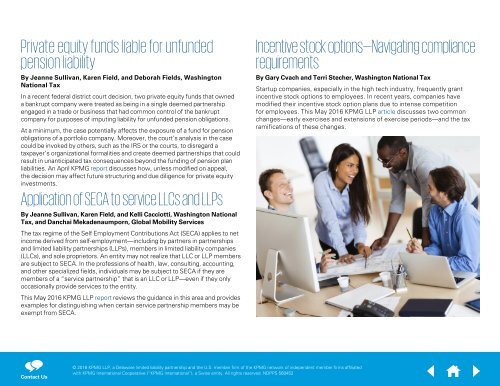Tax Dispute Resolution Quarterly
29rgRWs
29rgRWs
You also want an ePaper? Increase the reach of your titles
YUMPU automatically turns print PDFs into web optimized ePapers that Google loves.
Private equity funds liable for unfunded<br />
pension liability<br />
By Jeanne Sullivan, Karen Field, and Deborah Fields, Washington<br />
National <strong>Tax</strong><br />
In a recent federal district court decision, two private equity funds that owned<br />
a bankrupt company were treated as being in a single deemed partnership<br />
engaged in a trade or business that had common control of the bankrupt<br />
company for purposes of imputing liability for unfunded pension obligations.<br />
At a minimum, the case potentially affects the exposure of a fund for pension<br />
obligations of a portfolio company. Moreover, the court’s analysis in the case<br />
could be invoked by others, such as the IRS or the courts, to disregard a<br />
taxpayer’s organizational formalities and create deemed partnerships that could<br />
result in unanticipated tax consequences beyond the funding of pension plan<br />
liabilities. An April KPMG report discusses how, unless modified on appeal,<br />
the decision may affect future structuring and due diligence for private equity<br />
investments.<br />
Application of SECA to service LLCs and LLPs<br />
By Jeanne Sullivan, Karen Field, and Kelli Cacciotti, Washington National<br />
<strong>Tax</strong>, and Danchai Mekadenaumporn, Global Mobility Services<br />
The tax regime of the Self Employment Contributions Act (SECA) applies to net<br />
income derived from self-employment—including by partners in partnerships<br />
and limited liability partnerships (LLPs), members in limited liability companies<br />
(LLCs), and sole proprietors. An entity may not realize that LLC or LLP members<br />
are subject to SECA. In the professions of health, law, consulting, accounting,<br />
and other specialized fields, individuals may be subject to SECA if they are<br />
members of a “service partnership” that is an LLC or LLP—even if they only<br />
occasionally provide services to the entity.<br />
This May 2016 KPMG LLP report reviews the guidance in this area and provides<br />
examples for distinguishing when certain service partnership members may be<br />
exempt from SECA.<br />
Incentive stock options—Navigating compliance<br />
requirements<br />
By Gary Cvach and Terri Stecher, Washington National <strong>Tax</strong><br />
Startup companies, especially in the high tech industry, frequently grant<br />
incentive stock options to employees. In recent years, companies have<br />
modified their incentive stock option plans due to intense competition<br />
for employees. This May 2016 KPMG LLP article discusses two common<br />
changes—early exercises and extensions of exercise periods—and the tax<br />
ramifications of these changes.<br />
© 2016 KPMG LLP, a Delaware limited liability partnership and the U.S. member firm of the KPMG network of independent member firms affiliated<br />
with KPMG International Cooperative (“KPMG International”), a Swiss entity. All rights reserved. NDPPS 568452


